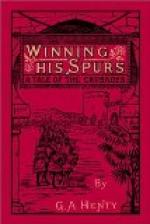“I fear that you are right, Sir Baldwin, and that there is no chivalry among these swinish German lords. You shall accompany me. Not, Sir Cuthbert,” he observed kindly, noticing a look of disappointment upon the face of the young knight, “that I estimate your fidelity one whit lower than that of my brave friend; but he is the elder and the more versed in European travel, and may manage to bring matters through better than you would do. You will have dangers enough to encounter yourself, more even than I shall, for your brave follower, Cnut, can speak no language but his own, and your archers will be hard to pass as any other than what they are. You must be my messenger to England, should you arrive there without me. Tell my mother and wife where you left me, and that, if I do not come home I have fallen into the hands of one or other of my bitter foes. Bid them bestir themselves to hold England for me against my brother John, and, if needs be, to move the sovereigns of Europe to free me from the hands of my enemies. Should a ransom be needed, I think that my people of England will not grudge their goods for their king.”
The following day the king bade farewell to his faithful followers, giving his hand to kiss, not only to Sir Cuthbert, but to Cnut and his archers.
“You have done me brave service,” he said, “and I trust may yet have occasion to do it again. These are bad times when Richard of England has nought wherewith to reward his friends. But,” he said, taking a gold chain from his neck and breaking it with his strong fingers into five fragments, “that is for you, Cnut, and for your four archers, in remembrance of King Richard.”
The men, albeit hardened by many scenes of warfare, yet shed tears plenteously at parting with the king.
“We had better,” Cuthbert said to them when they were alone, “delay here for a few days. If we are taken, the news that some Englishmen have been captured making their way north from Zara will spread rapidly, and may cause the enemies of Richard to be on the look-out for him, suspecting that the ship which bore us may also have carried him; for the news that he is missing will spread rapidly through Europe, and will set all his enemies on the alert.”
In accordance with this plan, they delayed for another ten days at Zara, and then, hiring a small boat, were landed some thirty miles further along the coast. Cuthbert had obtained for Cnut the dress of a palmer, as in this he would pass almost unquestioned, and his silence might be accounted for on the ground that he had taken a vow of silence. He himself had placed on his coat and armour a red cross, instead of the white cross borne by the English knights, and would now pass as a French knight. Similar changes were made in the dress of his followers, and he determined to pass as a French noble who had been wrecked on his way home, and who was returning through Germany to France. The difficulties in his own case would not be serious, as his French would pass muster anywhere in Germany. The greatest difficulty would be with his attendants; but he saw no way of avoiding this.




